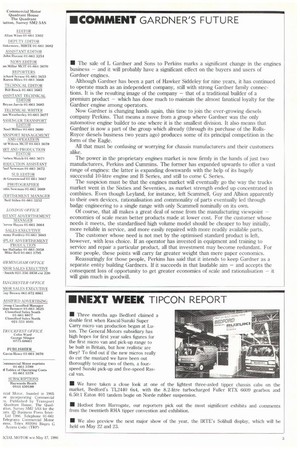IICOMMENT GARDNER'S FUTURE • The sale of L Gardner and
Page 3

If you've noticed an error in this article please click here to report it so we can fix it.
Sons to Perkins marks a significant change in the engines business — and it will probably have a significant effect on the buyers and users of Gardner engines.
Although Gardner has been a part of Hawker Siddeley for nine years, it has continued to operate much as an independent company, still with strong Gardner family connections. It is the resulting image of the company — that of a traditional builder of a premium product — which has done much to maintain the almost fanatical loyalty for the Gardner engine among operators.
Now Gardner is changing hands again, this time to join the ever-growing diesels company Perkins. That means a move from a group where Gardner was the only automotive engine builder to one where it is the smallest division. It also means that Gardner is now a part of the group which already (through its purchase of the RollsRoyce diesels business two years ago) produces some of its principal competition in the form of the Eagle.
All that must be confusing or worrying for chassis manufacturers and their customers alike.
The power in the proprietary engines market is now firmly in the hands of just two manufacturers, Perkins and Cummins. The former has expanded upwards to offer a vast range of engines: the latter is expanding downwards with the help of its hugely successful 10-litre engine and B Series, and still to come C Series.
The suspicion must be that the engines market will eventually go the way the trucks market went in the Sixties and Seventies, as market strength ended up concentrated in combines. Even though Leyland, for instance, left Scammell, Guy and Albion apparently to their own devices, rationalisation and commonality of parts eventually led through badge engineering to a single range with only Scammell nominally on its own.
Of course, that all makes a great deal of sense from the manufacturing viewpoint — economies of scale mean better products made at lower cost. For the customer whose needs it meets, the standardised high volume model should be cheaper to buy initially, more reliable in service, and more easily repaired with more readily available parts_ The customer whose need is not met by the optimised standard product is left, however, with less choice. If an operator has invested in equipment and training to service and repair a particular product, all that investment may become redundant. For some people, these points will carry far greater weight than mere paper economics.
Reassuringly for those people, Perkins has said that it intends to keep Gardner as a separate entity building Gardners. If it succeeds in that laudable aim — and accepts the consequent loss of opportunity to get greater economies of scale and rationalisation — it will gain much in goodwill.














































































